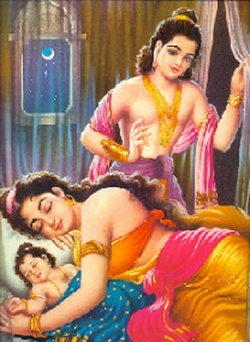Maha-mangala Sutta
The Mangala Sutta (Burmese: မင်္ဂလသုတ် Mingala thoke, Thai: มงคลสูตร, Khmer: មង្គលសូត្រ mongkhol sut, Sanskrit "mahāmaṅgalasūtra", "महामङ्गलसूत्र", Tibetan "བཀྲ་ཤིས་ཆེན་པོའི་མདོ།") is a discourse (Pali: sutta) of the Buddha on the subject of 'blessings' (mangala, also translated as 'good omen' or 'auspices' or 'good fortune').[1] In this discourse, the Buddha describes 'blessings' that are wholesome personal pursuits or attainments, identified in a progressive manner from the mundane to the ultimate spiritual goal. In Sri Lanka this is known as "Maha Mangala Sutta" and this sutta considered to be part of "Maha Pirith".
This discourse is recorded in Theravada Buddhism's Pali Canon's Khuddaka Nikaya in two places: in the Khuddakapāṭha (Khp 5), and in the Sutta Nipāta (Sn 2.4).[2] In the latter source, the discourse is called the Mahāmangala Sutta. It is also traditionally included in books of 'protection' (paritta). It is also found in the Tibetan Canon, in the Kangyur (བཀའ་འགྱུར།).
